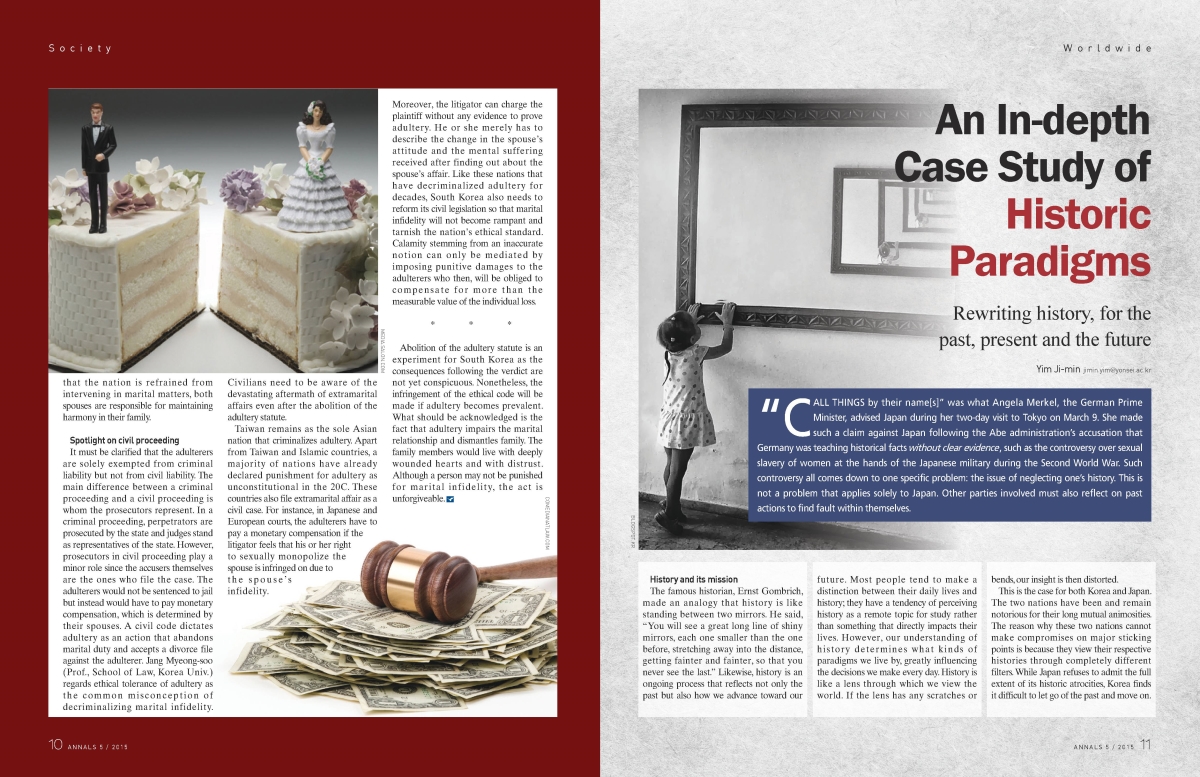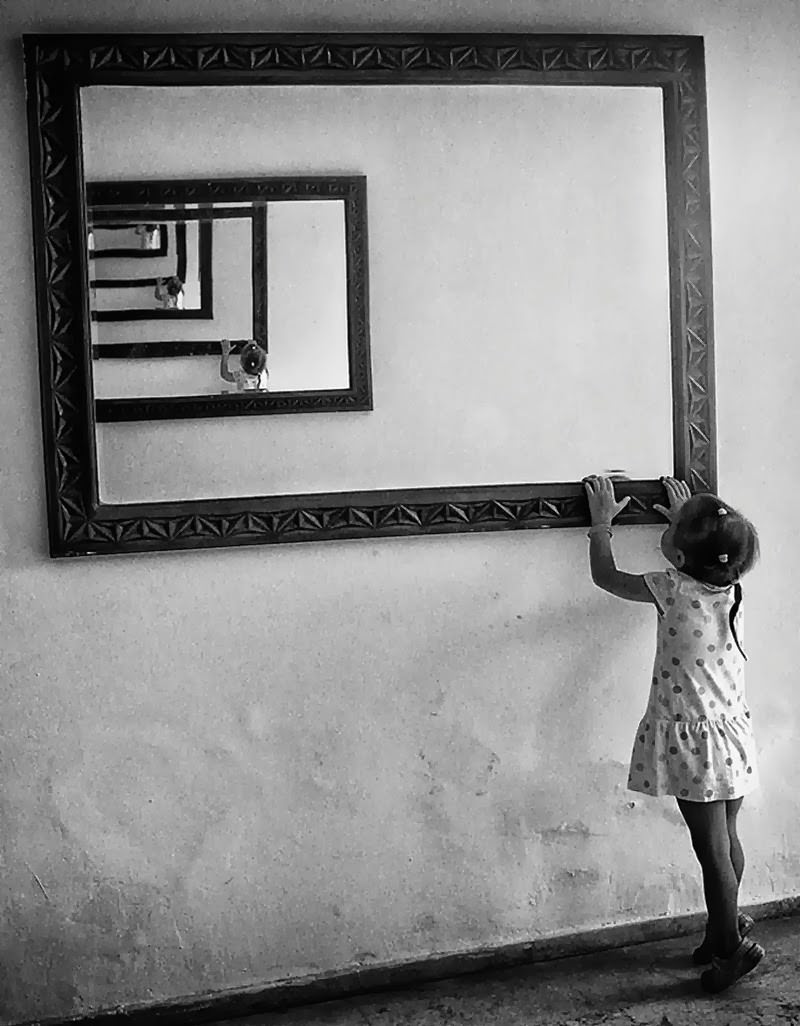Rewriting history, for the past, present and the future
 | ||
 | ||
“CALL THINGS by their name[s]” was what Angela Merkel, the German Prime Minister, advised Japan during her two-day visit to Tokyo on March 9. She made such aclaim against Japan following the Abe administration’s accusation that Germany was teaching historical facts without clear evidence, such as the controversy over sexual slavery of women at the hands of the Japanese military during the Second World War. Such controversy all comes down to one specific problem: the issue of neglecting one’s history. This is not a problem that applies solelyto Japan. Other parties involved must also reflect on past actions to find fault within themselves.
History and its mission
The famous historian, Ernst Gombrich, made an analogy that history is like standing between two mirrors. He said, “You will see a great long line of shiny mirrors, each one smaller than the one before, stretching away into the distance, getting fainter and fainter, so that you never see the last.” Likewise, history is an ongoing process that reflects not only the past but also how we advance toward our future. Most people tend to make a distinction between their daily lives and history; they have a tendency of perceiving history as a remote topic for study rather than something that directly impacts their lives. However, our understanding of history determines what kinds of paradigms we live by, greatly influencing the decisions we make every day. History is like a lens through which we view the world. If the lens has any scratches or bends, our insight is then distorted.
This is the case for both Korea and Japan. The two nations have been and remain notorious for their long mutualanimosities. The reason why these two nations cannot make compromises on major sticking points is because they view their respective histories through completely different filters. While Japan refuses to admit the full extent ofits historic atrocities, Korea finds it difficult to let go of the past and move on.
Case 1: Japan, turning a blind eye toward history
According to Professor Kim Sang-joon (Prof., Dept. of Political Science and Int’l Studies), there are two key ways of dealing with history: the first is reflecting upon past wrong-doings and the second is rationalizing the predecessor’s actions. Even within Japan, there are many who try to take the first approach, but unfortunately, the current government chose the latter option. “The Japanese government is not brave enough to admit the atrocities that they have committed in the past. It claims that the Japanese are not the only ones who have colonized other nations and that their people were killed in order to protect the nation. This is what we nowadays call turning rightist.” The process of aconservative swing in Japan began since the 1990s, as the families of the deceased kept appealing to the politicians who listened to their stories in order to gain their support. This led to many popular politicians, such as former Prime Minister Junichiro Koizumi, visiting the Yasukuni shrine to perform war memorial services, an act which greatly offended not only neighboring states such as Korea and China but the United Statesand Germany as well.
Another reason why the Japanese government has chosen to turn a blind eye toward its history is because of its deep connection to the past. As Kim also mentioned, “Although the case may slightly differ, the commonality between Germany and Japan is that they are both offenders that impaired other nations. Nonetheless, the two have chosen different ways of resolving this problem. The reason why Germany could handle this issue with more ease is because the majority of their population was able to detach themselves from the past. On the other hand, the Japanese government cannot because of an important figure, the Japanese Emperor. If they were to separate themselves from their predecessors to admit their faults, the Emperor would be in danger.” While most Germans have managed to cut off the Nazis as a discontinuous part of their history, the Japanese government keeps associating the country’s present with the past. As a result, admitting past offenses is seen in some quarters as equivalent to disgracing the contemporaries.
Case 2: South Korea, endlessly clinging to the past
Although most people seemed to focus on the German chancellor’s sharp words toward Japan, in fact, Angela Merkelwas giving advice to all of us. When asked how Germany was able to reconcile with its one-time enemies, Merkel answered that “without big gestures by our neighbors that would have not been possible.” It is not only Japan that has to “call things by their name[s],” but the Korean government should do the same.
“South Korea and China have different perspectives of viewing Japan. While China is making constant attempts to clearly divide the wartime criminals from the current Japanese people, South Korea is unable to do this,” says Kwon Sung-joo (Lecturer, Dept. of Political Science and Int’l Studies). Since its democratization, South Korea’santipathy toward Japan has amplified. Many people tend to make an over-generalization that all Japanese people lack moral judgments when it comes to history. In fact, this situation is worsened as the Korean government creates a negative atmosphere against Japan in order to bring about people’s nationalistic spirits. Also, the Koreanpress tends to appeal for judgment instead of reporting the objective truth.
During the 1980s, more than 60% of Japanese claimed that Japan must apologize for their wartime atrocities and these ordinary citizens have made several attempts to collect reparation fees on their own. Even now, there are many farsighted Japanese people who are trying to get things right. For instance, Nobel Laureate Oe Kenzaburo made a speech during the 130th anniversary of Yonsei University in which he stated that Japan has caused atrocities that cannot be forgiven andis not doing much to be pardoned. He claimed that “Prime Minister Abe, who has never experienced a real-life war situation, cannot even imagine what kind of dreadful crime Japan has committed.”
What many Koreans fail to realize is that only a minority of the Japanese population are showing such anignorant view toward history. In Japan, there is a gap between the government and the people regarding their historical views. This is because, when it comes to elections, people oftendo not consider what the politician’s view on history is. Rather, they choose their leaders based primarilyon their outlooks on economy, education, welfare and more. Thus, with regardto historical debates, the government’s positions do not necessarily represent that of the masses.
“The Japanese made many efforts to resolve the controversy over history. However, this is where South Korea failed to approach history in the correct way. Instead of targeting the rightist minorities, it chose to over-generalize Japan as being ignorant of such problems.” As time went by, the sweeping accusations made against Japan made the ordinary citizens of all ideological stripes turn their back against Korea as well. Nowadays, more than a half of the population believes that South Korea is abusing the historical issue for political reasons and trying to burden Japan with heavy requests.
Reconciliation through acceptance
Japan’s neglect of the past has made it difficult for East Asia to integrate as a whole. The negative sentiment toward Japan in Korea has reached its peak recently given ongoing disagreement on issues such as wartime sexual slavery, the Dokdo (Takeshima) island territorial disputes and so on. Similar lingering grievances also remain between China and various Southeast Asian countries that suffered under Japanese rule during the Second World War. Each country has its own stance and there seems to be no room for forgiveness or genuine reconciliation.
However, actions must be taken to resolve such matters, especially in order to achieve harmony within Northeast Asia. As Kwon put it, “Both Oriental and Western remedies must be applied in order to solve this problem.” He argues that, at the moment, South Korea is merely focusing on ‘Western’ treatments that may heal the scars on the outside. Nevertheless, if the fundamental problem is not fixed through ‘Oriental’ remedies, the virus would keep on grow inside and worsen the injury.
The ‘Oriental’ remedy, as Kwon sees it, is to tackle this problem in the long run by communicating with one another. Japan has its own faults too, but South Korea is also trying to push its historical views without considering Japan’s circumstances. This leads to a vicious cycle as the two countries avoid contact due to their different historical paradigms. Kwon also added, “South Korea must be courageous enough to face their narrow-mindedness in viewing Japan and break away from this vicious cycle. It needs to understand the other party instead of trying to force their own historical viewpoints. This kind of acceptance toward Japan can only be achieved by the younger generations. They must rid themselves of the older generation’s inflexible thoughts and work toward building a new relationship with Japan.”
* * *
It is high time that each nation does its best to work things out. Courage seems to be the key to solve the controversies over history in East Asia. Japan should learn to face its own past honestly and thoroughly and truly reflect upon the country’s past actions. The neighboring nations, for their part, must realize their lack of tolerance and try to understand Japan. This problem will persist unless both sides become brave enough to face their realities and rewrite history together. Rewriting history is not only limited to the past. Correcting historical distortions would also allow us to rewrite the history of our future that is to come.
Yim Ji-min
jiminyim@yonsei.ac.kr

